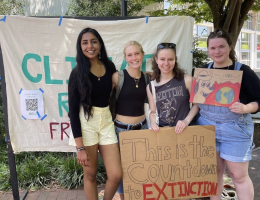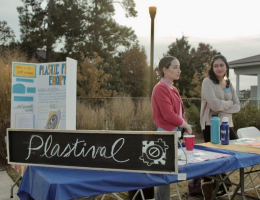Plastic Free Emory Highlights
Plastic-Free Emory is a student-led collaboration with faculty, staff, administrators, and practitioners at Emory dedicated to tackling single-use plastic on Emory & Oxford campuses. PFE is using outreach, education, policy changes, and most importantly a “Break Free From Plastic” pledge, signed by President Fenves, to establish a task force and plan in 2026 to reduce unnecessary single-use plastic.
Single-use plastics are flawed by design: they use a material made to last forever but are designed to be thrown away and are sometimes only used for a few moments before polluting the Earth for years to come.
Plastic Free Emory Benefits
- Emory University prioritizes socially actionable, ethically engaged, and inquiry driven pursuits: three values that are inextricably linked to sustainability advocacy on campus. PFE believes it is important to educate people on the various effects of plastic pollution on the environment and human health.
- Plastic Free Emory researches and encourages key institutional changes to reduce unnecessary single-use plastic at Emory. To do this, PFE uses data from their single-use plastic survey and case studies to promote policy changes on campus.
- PFE holds the University and the administration accountable to the Break Free From Plastic Pledge and furthers sustainability efforts around campus.
TAKE ACTION NOW!
Join our team and be a part of a family that is dedicated to eliminating Single Use Plastics at Emory!
Build your own Pledge and join our Giveaway!
Do your part in affecting sustainability in our communtiy by signing our petitions, which we have verified and compiled for your convenience.
How It Works
Outreach:
- Single-use plastic cannot be reduced on campus without making institutional and individual choices that align with this goal. PFE ensures that everyone in the Emory community feels heard and supported through various educational events, social media, and a survey that aims to gauge the community’s attitudes toward single-use plastics and Emory’s current waste management system.
Education:
- Unnecessary single-use plastic is an extremely intersectional issue. PFE believes it is important to educate people on the various effects of plastic pollution on the environment and human health.
Policy Changes:
- Institutional changes are key to reducing unnecessary single-use plastic at Emory. To do this, PFE uses data from a survey and case studies to promote policy changes on campus:
Undergraduate Student Government Association
Emory Undergraduate Student Government Association passed Resolution 54sl4 – Break Free from Plastic Resolution urging the Student Body Government to support a Break Free from Plastic pledge that would phase out unnecessary single-use plastic items on campus
Oxford Student Government Association
Oxford Student Government Association passed Resolution 21OxR07 -Plastic Free Emory Project
Graduate Student Government Association
Graduate Student Government Association passed Resolution O2fO321: Plastic Free Emory
Bachelor of Business Administration Council
Bachelor of Business Administration Council passed a Resolution to Support a “Break Free from Plastic” Pledge
University Senate
University Senate passed the “Resolution of the University Senate Concerning the Proposed Emory “Break Free From Plastic Pledge”
2021-2022 PROGRESS REPORT:
Read Plastic Free Emory’s detailed 2021-2022 progress report, highlighting all the work PFE has done over the past year, incredible allyship, and current roadblocks to implementation. Plastic Free Emory is excited to continue learning and growing with the Emory community!
Break Free From Plastic Pledge
A campus pledge inspired by Post Landfill Action Network’s Toolkit which guides colleges and universities toward single-use plastic elimination. Many academic institutions nationwide have signed similar pledges, enacted stringent purchasing guidelines, phased-out plastic bags and food service items in retail and dining locations, and committed to single-use plastic elimination by 2025.



